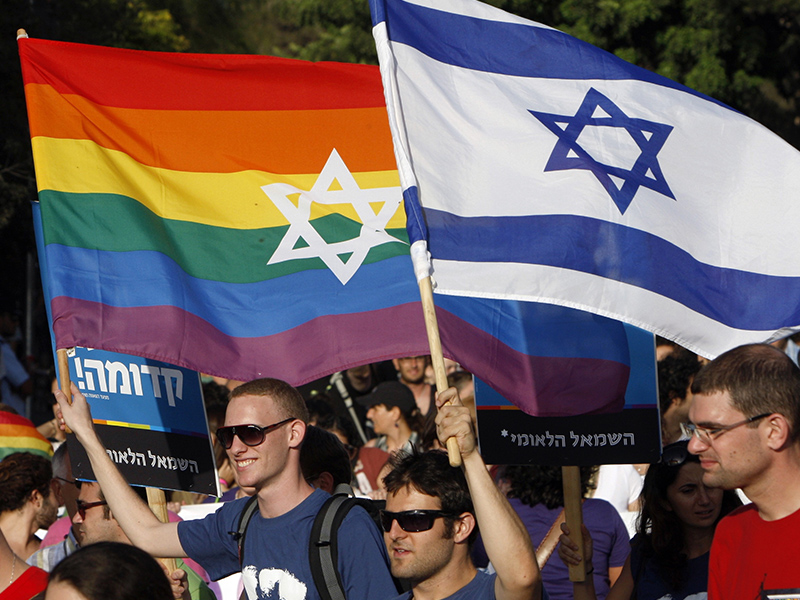Canadian groups representing LGBTQ Jews have roundly denounced a June 24 incident in Chicago, in which three people carrying Jewish Pride flags were asked to leave that city’s annual Dyke March.
To some, the incident revealed disturbing and lingering anti-Israel attitudes within the LGBTQ community.
The Chicago-based LGBTQ newspaper Windy City Times quoted a Dyke March official saying that the rainbow flag with the Star of David in the middle “made people feel unsafe,” and that the march was “pro-Palestinian” and “anti-Zionist.”
The multi-hued banner “celebrates my queer, Jewish identity, which I have done for over a decade marching in the Dyke March with the same flag,” Laurel Grauer, a member of the Jewish LGBTQ organization, A Wider Bridge, told the Windy City Times.
“They were telling me to leave because my flag was a trigger to people that they found offensive,” she added.
Another marcher who was asked to leave because of a Jewish flag said, “I felt that, as a Jew, I am not welcome here.”
READ: EXPLORING MY IDENTITY AS A LGBTQ JEWISH PERSON ON BIRTHRIGHT ISRAEL
The U.S. Anti-Defamation League called for an apology, saying the action was “outrageous.” The Simon Wiesenthal Center said banning Jewish Pride flags brought “disgrace to a movement that is dedicated to equal rights for all.”
Sheri Krell, executive director of Kulanu Toronto, told The CJN that her group was “appalled that a symbol of Jewish identity was banned in Chicago. Pride is a time for love and a celebration of the multiple groups we identify with as the LGBT Jewish community.”
She said LGBTQ Jews “have had nothing but support here in Toronto at the Dyke March, with our flags celebrating both of our identities.”
Indeed, Kulanu, Pride Toronto, The 519 community centre and the Centre for Israel and Jewish Affairs co-sponsored a Shabbat dinner at The 519 on June 14, Krell noted.
For residents of Toronto, what happened in Chicago may have brought back memories of Queers Against Israeli Apartheid (QAIA), which folded in 2015, after seven years of displaying solidarity with Palestinians at Pride marches, amid much controversy.
One term QAIA and other anti-Israel LGBTQ groups used consistently was “pinkwashing” – the idea that Israel is citing of its record on gay rights to divert international attention from its treatment of the Palestinians.A

To Carlos Godoy, executive director of the Montreal Jewish LGBTQ group Ga’ava, that’s “an intellectual shortcut.”
“Before we can even talk about how Israel’s government may or may not have oppressive policies against Palestinian LGBTQs, let’s talk about oppressive policies Palestinians have against their own LGBTQ people,” Godoy told The CJN from Madrid, where he was attending the WorldPride conference.
“Let’s talk about the situation of gays and lesbians in the Middle East in general, in every Arab country,” Godoy added, noting that they can face murder at the hands of their families.
As for the incident in Chicago, “it’s not the first time I hear of similar issues at all sorts of Pride-related events, where one very twisted, marginalized group will call itself threatened or terrorized by what we recognize as a universal sign of Judaism. It’s fallacious and wrong and it’s anchored in everything that’s ugly. It doesn’t have its place at Pride,” said Godoy.
When LGBTQ Jews “are asked to cut off a part of our identity, to hide our Judaism, it flies directly in the face of what Pride is supposed to be about – forcing Jews into a closet if they want to be a part of the queer community,” said Tom Chervinsky, chair of the Centre for Israel and Jewish Affairs’ LGBTQ+ advisory council.
“To demand all Jewish symbols and identity be subject to censorship or loyalty tests – that crosses the line into anti-Semitism of the most classic sort,” Chervinsky told The CJN.
The “misguided” actions at the Chicago Dyke March “do not represent the majority of the queer community, but do underline a disturbing trend of scapegoating and anti-Semitism in some LGBTQ activist circles,” he said.
